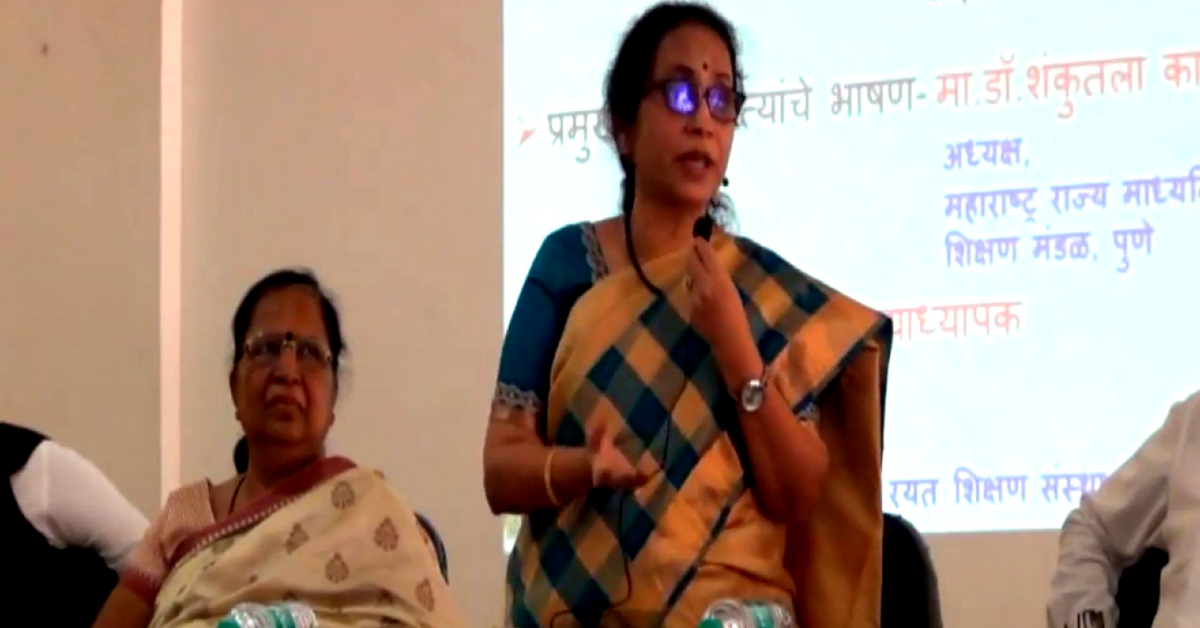Shakuntala Kale, the chairperson for the Maharashtra State Board of Secondary and Higher Secondary Education, has undergone incredible struggles to reach where she has today.
Hailing from a small village in Ambegaon Taluka in Pune district, Shakuntala lost her father in Class IV, and her mother was subsequently forced to work as a labourer in the fields.
As a result of the family’s dire financial situation, she was “married off” at the age of 14 soon after she had passed Class X. Education soon took a backseat.
“We didn’t have a junior college in our village and there was no way I would have been sent outside to study. So, I was married off at the age of 14,” Shakuntala tells the Times of India.
After marriage she moved into her husband’s household and gave birth to two children. To put things mildly, women’s education wasn’t a priority in her community.
“Society was regressive and probably still is in many villages. They don’t want women to go out, study or work. But my husband and father-in-law were as supportive as the system would allow it,” she told the daily publication. However, she was determined to make something out of herself.

Thanks to a distance learning programme at Savitribai Phule Pune University, she completed her diploma in Education, followed by a BA and MA in Marathi language.
“After I completed my DEd, I was working as a teacher in the same school where I studied. Normally, one thinks that if there are facilities one can improve. But when everything is against you, when you are aware that conditions will never improve for you, then you find strength within. I started dreaming of taking the Maharashtra Public Service Commission exam,” she told ToI.
With absolutely no access to necessary study material for the exams or a even access to a television, she relied on the household radio to keep abreast of the news and improve her general knowledge. At home, meanwhile, she was waking up at 3 am to fetch water from the village well, while completing her household chores before and after her teaching schedule for the day.
Finally, in 1993, she passed the MPSC Class II exam, and was given a position at the education department in Solapur.
“In 1995, I cleared the exam for Class I officer and was appointed head of women’s education and extension department. The year I completed my PhD in the portrayal of women in rural novels was the international year for women,” she told ToI.
Also Read: Leaving No One Behind: Here’s the Kind of Education That Can Transform India
After spending nearly two decades across various education departments, Shakuntala was appointed chairperson of the state board in September 2017.
There are still parts of this country where women are up against incredible restrictions to their growth and development. Some are denied the opportunity to further their education, while others don’t even get a chance at going to school. This is precisely why Shkauntala Kale’s story is so inspirational. She made it, despite the shackles society put on her.
(Edited By Vinayak Hegde)
Like this story? Or have something to share? Write to us: contact@thebetterindia.com, or connect with us on Facebook and Twitter.
NEW: Click here to get positive news on WhatsApp!
If you found our stories insightful, informative, or even just enjoyable, we invite you to consider making a voluntary payment to support the work we do at The Better India. Your contribution helps us continue producing quality content that educates, inspires, and drives positive change.
Choose one of the payment options below for your contribution-
By paying for the stories you value, you directly contribute to sustaining our efforts focused on making a difference in the world. Together, let's ensure that impactful stories continue to be told and shared, enriching lives and communities alike.
Thank you for your support. Here are some frequently asked questions you might find helpful to know why you are contributing?
